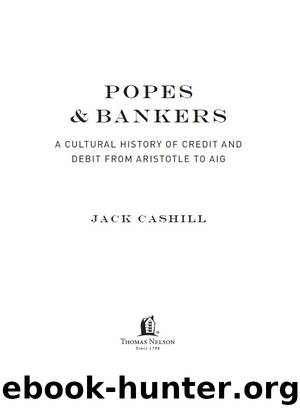Popes and Bankers by Jack Cashill

Author:Jack Cashill [Cashill, Jack]
Language: eng
Format: epub
Publisher: Thomas Nelson
Published: 2018-08-02T00:00:00+00:00
eighteen Cross of Gold
THE ELECTION OF 1896 REPRESENTS THE MOST DRAMATIC PARTY REALIGNMENT in the history of American politics. The party of Jefferson, Jackson, and Grover Clevelandâhard-money men allâwent soft. The transition was not an easy one. Said the partyâs eventual nominee of the struggle, evoking the language of the Civil War, âBrother has been arrayed against brother, and father against son. The warmest ties of love and acquaintance and association have been disregarded.â 1
The struggle centered not on war and peace or prohibition or segregation, all potentially hot topics, but on a single issue that could be summarized in a single word: gold. The insurgent soft-money forces, Americaâs debtor class, were rising up in righteous indignation against their creditors, the âfew financial magnates who in a backroom corner the money of the world.â 2 Standing in the way of the insurgents were the so-called Bourbon Democrats, who were alleged to do their financial mastersâ bidding. What the insurgents demanded was nothing less than an abandonment of the gold standard. Said their thirty-six-year-old leader in the speech that would net him the partyâs nomination, âYou shall not press down upon the brow of labor this crown of thorns. You shall not crucify mankind upon a cross of gold.â 3
By this time the Republicans had already nominated William McKinley as their candidate for the presidency. But William Jennings Bryan, the âboy orator of the plains,â was savvy enough to know that he was facing a more formidable opponent than McKinleyâa more formidable opponent, for that matter, than the power broker behind McKinley, Mark Hanna. No, to win, Bryan would have to best the man whose power Hanna brokered, Americaâs most formidable banker ever and arguably the most powerful man in the world circa 1896, John Pierpont Morgan.
The ascent of the house of Morgan gives a reassuring ecumenical coloring to the history of investment banking: they were the Protestants to the Medicisâ Catholics to the Rothschildsâ Jews. The Morgans, a term used here to include partners as well as family members, would also oversee, quite literally, the shift of the worldâs financial power from London to New York. As with the Medicis and the Rothschilds, their story begins with a hardworking patriarch and reaches its ascendancy with a son.
In 1837, the year of the Panic, the year coincidentally that Pierpont was born, Baltimore merchant George Peabody (pronounced PEE-buh-dee) moved to London. Already respected in international circles, Peabody opened a merchant house and began to do business. He traded in dry goodsâa catchall phrase for textiles, clothing, and the equally elusive âsundriesââand financed other trades as well. Businesses like his were known as merchant banks, the progenitors of todayâs investment banks. 4 Merchant bankers dealt exclusively with institutions and what we have come to callâisnât there a better phrase?â âhigh net-worth individuals.â They issued stocks and bonds, financed overseas trade, and brokered commodities among other services. Theirs was a world without teller windows or Christmas clubs or velvet rope lines in the lobby.
Not content to blend into Londonâs oaken woodwork, Peabody positioned himself as an American banker.
Download
This site does not store any files on its server. We only index and link to content provided by other sites. Please contact the content providers to delete copyright contents if any and email us, we'll remove relevant links or contents immediately.
International Integration of the Brazilian Economy by Elias C. Grivoyannis(110857)
The Radium Girls by Kate Moore(12019)
Turbulence by E. J. Noyes(8040)
Nudge - Improving Decisions about Health, Wealth, and Happiness by Thaler Sunstein(7694)
The Black Swan by Nassim Nicholas Taleb(7111)
Rich Dad Poor Dad by Robert T. Kiyosaki(6613)
Pioneering Portfolio Management by David F. Swensen(6289)
Man-made Catastrophes and Risk Information Concealment by Dmitry Chernov & Didier Sornette(6007)
Zero to One by Peter Thiel(5789)
Secrecy World by Jake Bernstein(4743)
Millionaire: The Philanderer, Gambler, and Duelist Who Invented Modern Finance by Janet Gleeson(4469)
The Age of Surveillance Capitalism by Shoshana Zuboff(4279)
Skin in the Game by Nassim Nicholas Taleb(4240)
The Money Culture by Michael Lewis(4198)
Bullshit Jobs by David Graeber(4179)
Skin in the Game: Hidden Asymmetries in Daily Life by Nassim Nicholas Taleb(3993)
The Dhandho Investor by Mohnish Pabrai(3760)
The Wisdom of Finance by Mihir Desai(3735)
Blockchain Basics by Daniel Drescher(3574)
